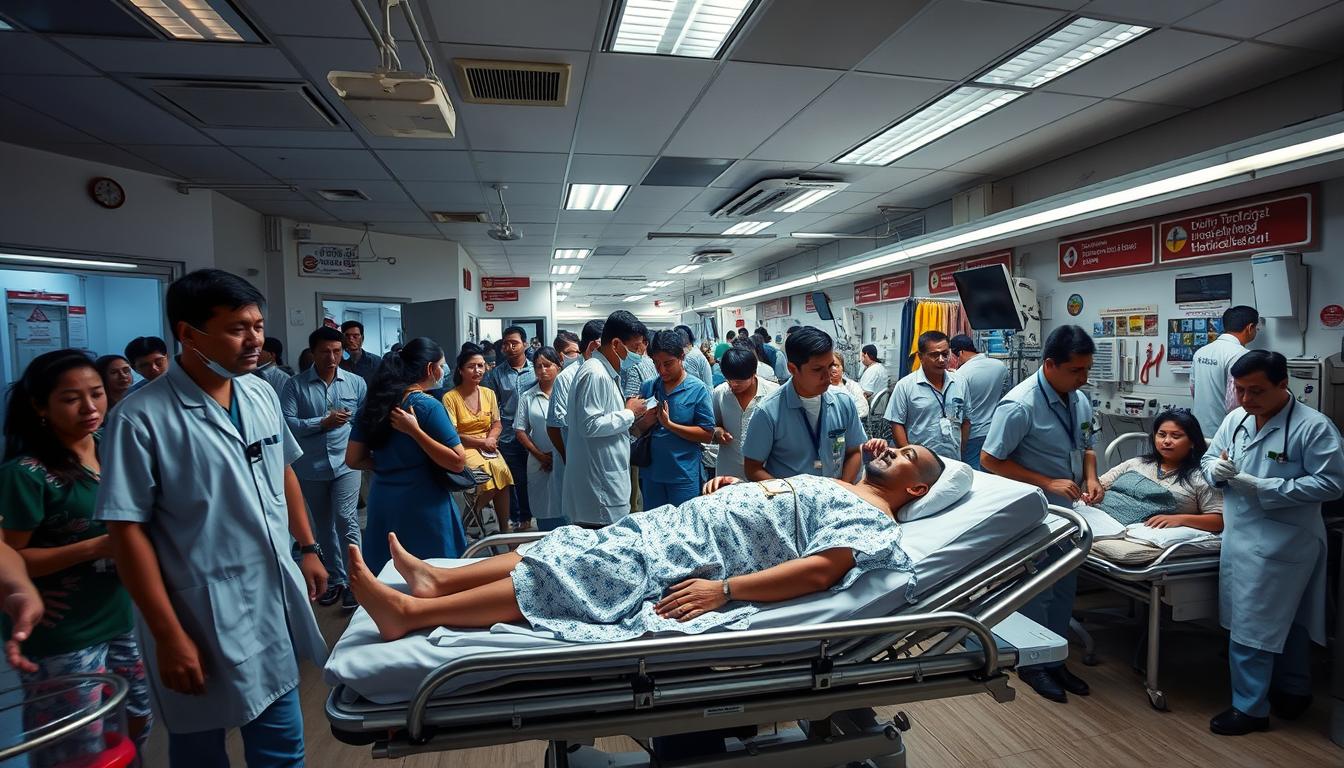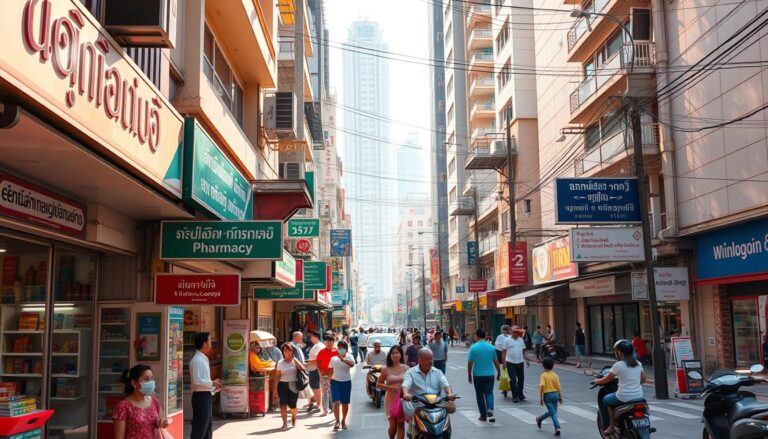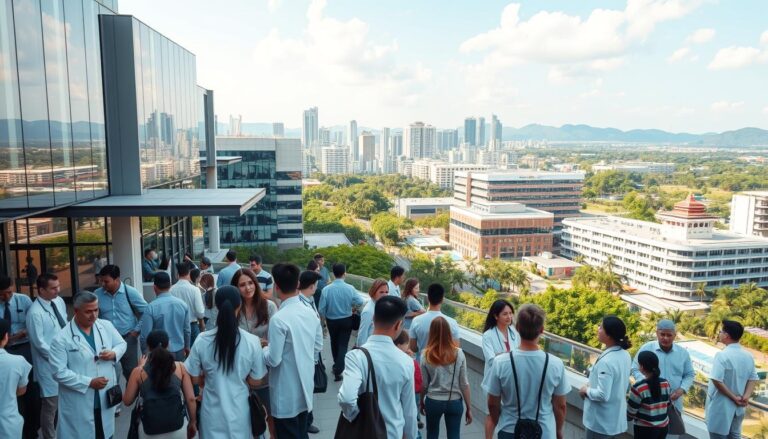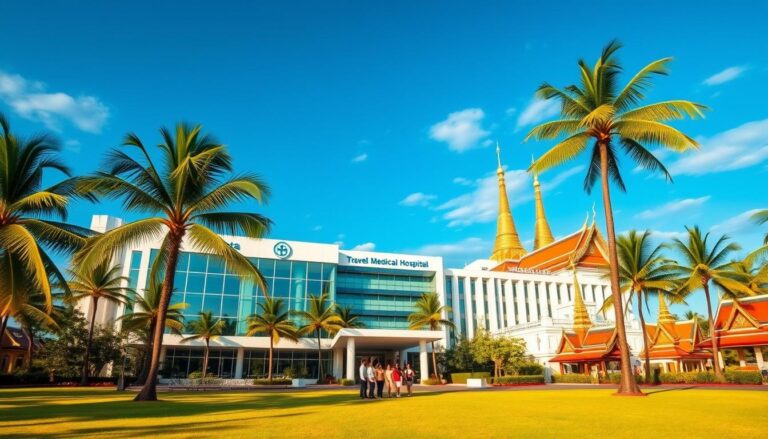Thailand Medical Emergencies: First Steps & Help
Did you know that over 39 million tourists visit Thailand every year? Many of them face unexpected medical problems. It’s vital to be ready for medical emergencies when you travel abroad.
Visiting Thailand means you’re in for exciting adventures. But, illnesses or accidents can happen suddenly. Language differences and not knowing the local healthcare can make things worse.
Knowing these challenges helps you take the right steps. By understanding the possible medical emergencies, you can stay safe and healthy during your visit.
Understanding Common Medical Emergencies in Thailand
When you travel to Thailand, knowing about common medical emergencies is key. Thailand’s healthcare system is good for tourists. But, being ready is important for any medical issue.
Overview of Typical Emergencies
In Thailand, tourists might face many medical emergencies. Common problems include heatstroke, dehydration, and allergic reactions. Knowing these can help you prevent and respond to them.
- Heatstroke and dehydration are common due to Thailand’s tropical climate.
- Allergic reactions can occur from food, insect bites, or environmental factors.
- Minor injuries, such as cuts and sprains, are also frequent among tourists.
Specific Health Risks for Tourists
Tourists in Thailand face health risks not seen at home. Food poisoning and waterborne illnesses are common because of different sanitation standards. Knowing these risks helps you stay safe.
Some specific health risks include:
- Food poisoning from contaminated or undercooked food.
- Waterborne illnesses from untreated water.
- Infectious diseases like dengue fever and Zika virus, spread by mosquitoes.
Recognising Signs of a Medical Emergency
It’s vital to know the signs of a medical emergency. Symptoms like severe chest pain, trouble breathing, or serious bleeding need quick medical help. Spotting these signs can be life-saving.
Some important signs to look out for are:
- Severe chest pain or trouble breathing.
- Severe bleeding that won’t stop.
- Severe headache or confusion.
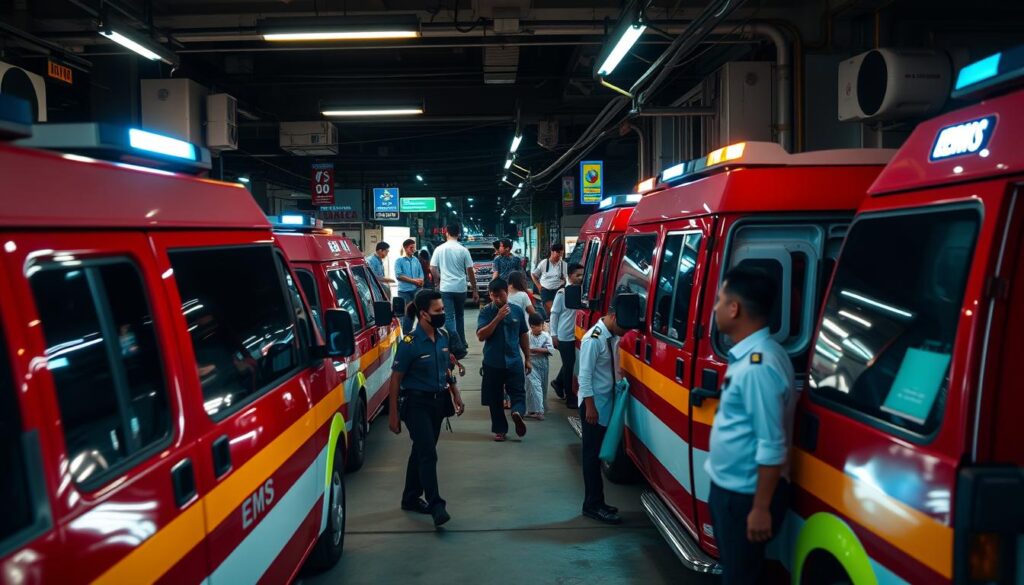
Preparing for Possible Medical Emergencies
When planning your trip to Thailand, think about how to prepare for medical emergencies. Being ready can make unexpected health issues less stressful. It helps keep your trip fun and safe.
Essential Travel Insurance Tips
Getting the right travel insurance is key for Thailand trips. It protects you financially in case of medical emergencies, trip cancellations, or lost luggage. Here are some tips for choosing the best policy:
- Make sure your policy covers medical evacuations, as these can be very expensive.
- Check if your policy includes coverage for adventure activities, if you plan to do them.
- Understand the claims process and keep important documents handy.
- Look for a policy with 24/7 emergency support.
Choosing a good travel insurance policy gives you peace of mind. You’ll know you’re covered for unexpected medical costs.
Packing a Travel Medical Kit
A good travel medical kit is essential for emergencies. It should have items for minor issues and serious conditions until help arrives.
- Include basic first aid items like bandages, antiseptic wipes, and pain relievers.
- Carry any personal medications and a copy of your prescription.
- Think about adding items for specific needs, like altitude sickness or motion sickness medication.
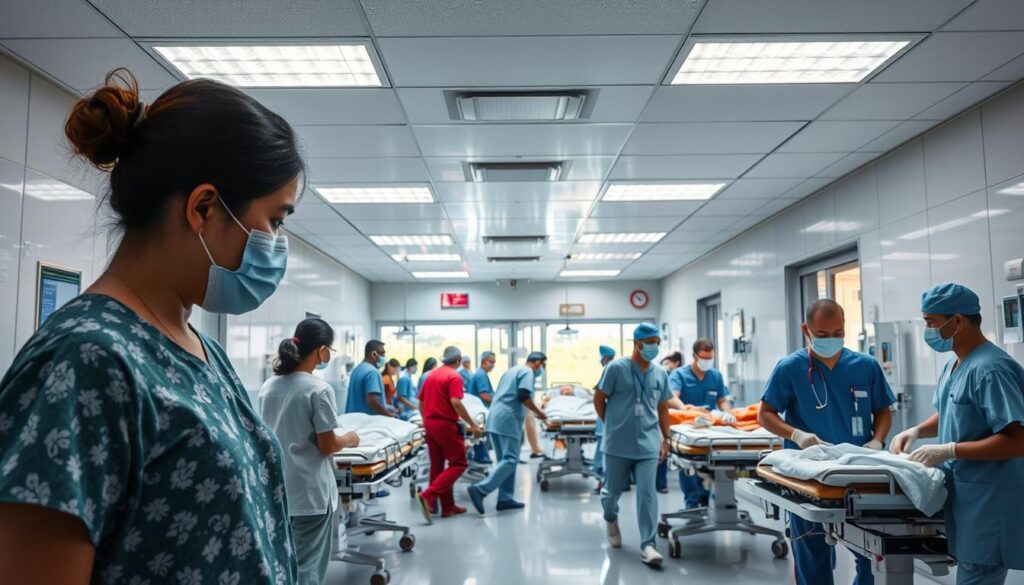
With the right insurance and a travel medical kit, you can handle medical emergencies better. This ensures a safer, more enjoyable trip to Thailand.
Navigating the Thai Healthcare System
Exploring Thailand’s healthcare system might seem tough at first. But, with the right info, you can have a smooth experience. Thailand’s healthcare is well-respected, with many facilities for both locals and visitors.
Types of Medical Facilities Available
Thailand offers a wide range of medical places, like clinics, hospitals, and special treatment centres. You can get medical scripts and some regulated pharmacy services. Clinics are great for non-urgent issues, like general check-ups and vaccinations.
Hospitals provide more detailed care, including emergency services and surgeries. Some big city hospitals have the latest tech and staff who speak English well, making them good for international visitors.
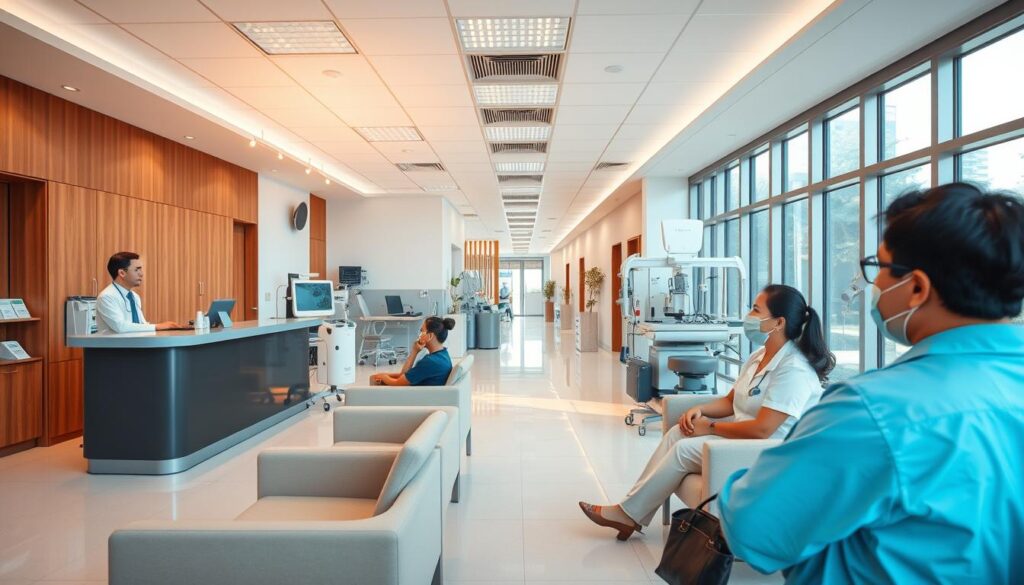
Public vs. Private Hospitals
Thailand has both public and private hospitals. Public hospitals are cheaper but can be busy and have less English spoken. Private hospitals cost more but offer better care, quicker service, and more English-speaking staff, making them popular with tourists.
What to Expect During Your Visit
Visiting a medical facility in Thailand means different things depending on the type of hospital. You’ll first need to register and show ID. In private hospitals, this is easier, and staff are often more welcoming to foreigners.
Many doctors in Thailand have international training, and some hospitals are internationally accredited. This ensures top-notch care. Knowing what to expect in a medical emergency can help you stay calm and get the right help quickly.
It’s key for tourists to understand Thailand’s healthcare system to handle medical emergencies well. Knowing about the different facilities and what to expect helps you make better choices for your care.
How to Respond to a Medical Emergency
Knowing the right steps in a medical emergency can save lives. In Thailand, being ready can make a big difference. Whether in a busy city or a quiet area, knowing how to act is key.
Assessing the Situation Quickly
The first step is to assess the situation calmly. Figure out the emergency’s nature and how serious it is. Look for dangers and then act.
Stay calm and think clearly to help or call for help well.
Calling for Help: Emergency Numbers
In Thailand, remember these emergency numbers. For general medical emergencies, call 1669. In Bangkok, use 1646 for public EMS. For private EMS under BDMS, dial 1724. Having these numbers ready can help fast.
- 1669 for general medical emergencies
- 1646 for public EMS in Bangkok
- 1724 for private EMS under BDMS
Save or memorize these numbers for quick access in emergencies.
Initial First Aid Steps You Can Take
While waiting for help, you can do some first aid. For minor injuries, basic care can be given. But for serious cases, follow the emergency operator’s advice.
If you know first aid, you can help. If not, keep the person calm and safe until help comes.
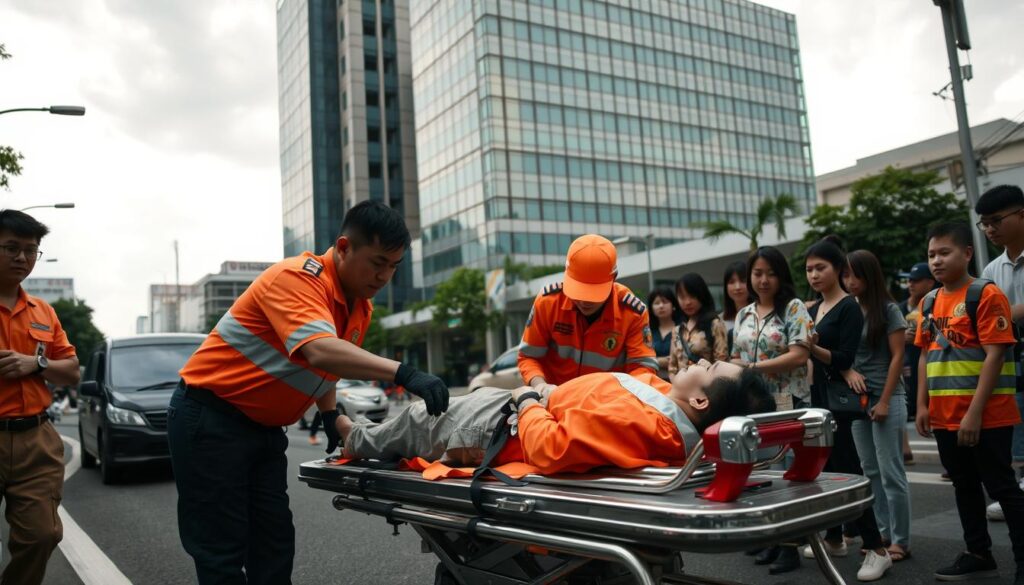
Being prepared and knowing how to handle medical emergencies in Thailand is important. Learn about local emergency services and procedures to stay safe during your trip.
Language Barriers in Medical Emergencies
In Thailand, knowing Thai can save lives in medical emergencies. Language barriers can affect the care you get. It’s key to communicate well with healthcare providers.

Basic Thai Phrases for Medical Emergencies
Learning simple Thai phrases can help in medical emergencies. Saying “I am sick” (ข�ยป่วย – Khor phom mai sabai for males, Khor chan mai sabai for females) or “Where is the hospital?” (โรงพยาบาลอยู่ที่ไหน? – Rong phayaban yu thi nai?) is useful. Also, “I need a doctor” (ฉันต้องการหมอ – Chan tong kan mo) is helpful.
Key phrases to learn include:
- Greetings: “Sawatdee” (สวัสดี) – Hello/Goodbye
- Basic Questions: “Mai ow hai?” (ไม่โอเคไหม) – Are you okay?
- Medical Needs: “Chan/Phom mai sabai” (ฉัน/ผม ไม่สบาย) – I am not feeling well
Using Translation Apps Effectively
Translation apps can also help in medical emergencies. Apps like Google Translate can translate text or speech in real-time. This helps you talk to healthcare providers.
Tips for using translation apps:
- Download the app before you travel to ensure you have access to it offline.
- Familiarize yourself with the app’s features, such as speech-to-text functionality.
- Keep your phone charged and consider carrying a portable charger.
Finding Reliable Medical Assistance
It’s important to know how to find trustworthy medical care in Thailand for a safe trip. Whether you’re in Bangkok or a rural area, knowing where to go and how to get help is key in a medical emergency.
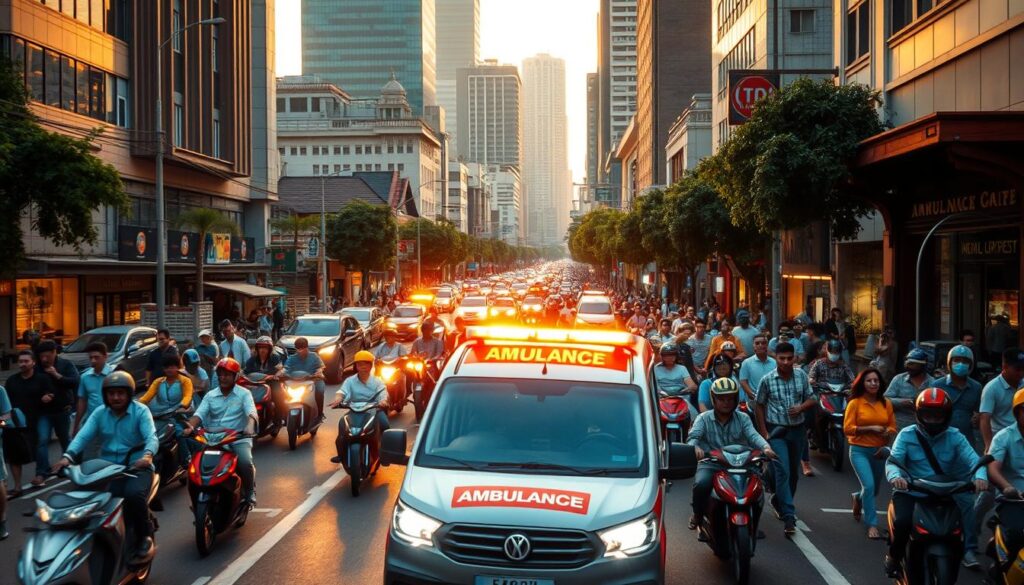
Top Hospitals in Major Cities
Thailand has many world-class hospitals, mainly in cities like Bangkok, Chiang Mai, and Phuket. In Bangkok, Bumrungrad International Hospital and Bangkok Hospital stand out. They are known for their high care standards and English-speaking staff. These hospitals provide a wide range of services, from emergency care to specialized treatments.
Key features to look for in a hospital include:
- English-speaking staff
- Modern facilities and equipment
- 24-hour emergency services
- Specialized departments (e.g., cardiology, orthopedics)
Seeking Help from Local Authorities
In a medical emergency, local authorities can be very helpful. The Thai police and tourist police are usually supportive. They can help you contact medical services. Save important emergency numbers, like 191 for the police and 1669 for the ambulance.
Utilising Hotel and Travel Assistance Services
Many hotels, mainly the high-end ones, offer medical assistance or recommend local hospitals. Some travel insurance providers also offer 24-hour assistance to help find medical care. If you need help, don’t hesitate to contact your hotel or insurance provider.
Major embassies have lists of English-speaking doctors and medical centers. Expat communities and online forums are also great for finding reliable medical help.
Knowing where to find reliable medical assistance ensures you get the care you need in Thailand.
Post-Emergency Care and Travel Considerations
After a medical emergency in Thailand, your recovery doesn’t have to be disrupted. Getting proper post-emergency care is key for a smooth recovery. It lets you travel with confidence.
Follow-Up Care
Book follow-up appointments at a trusted hospital emergency Thailand facility. Places like Bangkok Hospital or Chiang Mai Ram Hospital are good choices. This helps catch any complications early.
Managing Your Medications
Keep your prescriptions with you and know Thailand’s rules on medication. Use emergency clinics Thailand for any medical advice you need.
Knowing When to Seek Further Help
If your condition gets worse or you have new symptoms, seek help. Look into medical evacuation Thailand services for specialised care. Being prepared helps you handle tourism medical emergencies Thailand better.

